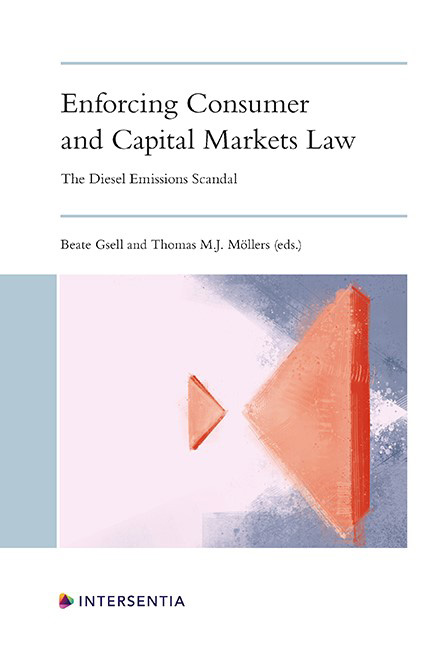Book contents
- Frontmatter
- Acknowledgement
- Contents
- List of Cases
- List of Abbreviations
- List of Contributors
- PART I INTRODUCTION
- PART II EUROPE
- PART II BEYOND EUROPE
- PART III THE SUPRANATIONAL PERSPECTIVE
- PART IV LEGAL PRACTICE PERSPECTIVE
- PART V INTRADISCIPLINARY ANALYSIS AND REFORM RECOMMENDATIONS
- Key Source Bibliography
- Index
- About the Editors
Enforcing Consumer and Capital Markets Law in Lithuania
Published online by Cambridge University Press: 22 December 2020
- Frontmatter
- Acknowledgement
- Contents
- List of Cases
- List of Abbreviations
- List of Contributors
- PART I INTRODUCTION
- PART II EUROPE
- PART II BEYOND EUROPE
- PART III THE SUPRANATIONAL PERSPECTIVE
- PART IV LEGAL PRACTICE PERSPECTIVE
- PART V INTRADISCIPLINARY ANALYSIS AND REFORM RECOMMENDATIONS
- Key Source Bibliography
- Index
- About the Editors
Summary
This chapter describes public and private enforcement of consumer and capital market law in Lithuania. It is based on the analysis of two cases involving the diesel emissions scandal: Case 1 and Case 2. This chapter focuses on the public monitoring by governmental authorities of economic operators (traders) and liability for unfair competition. Also, it explains individual and collective mechanisms for private enforcement of consumer law in civil proceedings. In cases of large-scale infringements, the modern legal system shall ensure the same level of judicial defence which is guaranteed in individual cases. However, the model of individualistic civil proceedings which is based on individual and active involvement and participation of all parties is unable to deal with the challenges deriving from large-scale infringements. A novelty in this area in Lithuania is the right to file a class action. A class action is particularly relevant for enforcement of individual and collective legal remedies. Furthermore, this report covers private enforcement of capital market law in case of bad faith actions in the sale and purchase contract of corporate's shares.
The chapter consists of four parts: Public Law (Section I), Private Enforcement of Consumer Law (Section II), General Procedural Law (Section III), Protection of Rights in the Capital Market (Section IV) and conclusions (Section V).
PUBLIC LAW
This section of the chapter explains which public authorities protect consumer rights and what sanctions they can impose for violation of consumer law, according to the Case 1 example and discuses other relevant questions.
DO ELIMINATIONS OF CONSEQUENCES, DAMAGES AND SKIMMING OF PROFITS (BY FINES) EXIST?
Consumer law is enforced by various public authorities in Lithuania. Some public authorities focus on specific market areas (energetics, financial services) and some of them deal with the general enforcement of consumer law. The State Consumer Rights Protection Authority (lt. Valstybinė vartotojų teisių apsaugos tarnyba) (thereafter – Authority) and the Competition Council of the Republic of Lithuania (lt. Lietuvos Respublikos konkurencijos taryba) (thereafter – Council) are the main governmental institutions which deal with protection of consumer rights. The primary tool for public enforcement of consumer law is imposition of sanctions (fines) to economic operators (traders) which have infringed consumer rights and fair competition.
- Type
- Chapter
- Information
- Enforcing Consumer and Capital Markets LawThe Diesel Emissions Scandal, pp. 181 - 202Publisher: IntersentiaPrint publication year: 2020

